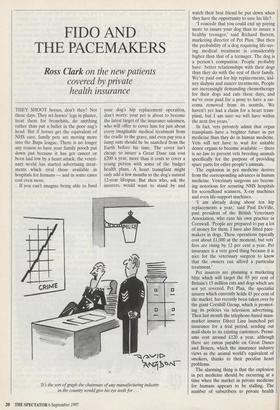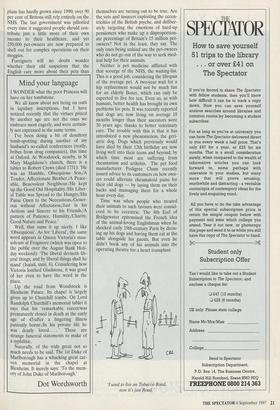FIDO AND THE PACEMAKERS
Ross Clark on the new patients
covered by private health insurance
THEY SHOOT horses, don't they? Not these days. They set horses' legs in plaster, treat them for bronchitis, do anything rather than put a bullet in the poor nag's head. But if horses get the equivalent of NHS care, family pets are moving more into the Bupa league. There is no longer any reason to have your family pooch put down just because it has got cancer or been laid low by a heart attack; the veteri- nary world has started advertising treat- ments which rival those available in hospitals for humans — and in some cases cost even more.
If you can't imagine being able to fund your dog's hip replacement operation, don't worry: your pet is about to become the latest target of the insurance salesmen, who will offer to cover him for just about every imaginable medical treatment from the cradle to the grave, and even pay you a lump sum should he be snatched from the Earth before his time. The cover isn't cheap: to insure a Great Dane can cost £200 a year, more than it costs to cover a young person with some of the budget health plans. A heart transplant might only add a few months to the dog's natural 12-year lifespan. But then who, ask the insurers, would want to stand by and `It's the sort of graph the chairman of any manufacturing industry in the country would give his eye teeth for . . . ' watch their best friend be put down when they have the opportunity to save his life?
`I concede that you could end up paying more to insure your dog than to insure a healthy teenager,' said Richard Barrett, marketing director of Pet Plan. 'But then the probability of a dog requiring life-sav- ing medical treatment is considerably higher than that of a teenager. The dog is a person's companion. People probably have better relationships with their dogs than they do with the rest of their family. We've paid out for hip replacements, kid- ney dialysis and cancer treatments. People are increasingly demanding chemotherapy for their dogs and cats these days, and we've even paid for a pony to have a sar- coma removed from its nostrils. We haven't yet had a claim for a heart trans- plant, but I am sure we will have within the next five years.'
In fact, vets privately admit that organ transplants have a brighter future in pet medicine than they do in human medicine. Vets will not have to wait for suitable donor organs to become available — there is no law to prevent vets breeding animals specifically for the purpose of providing spare parts for other people's animals.
The explosion in pet medicine derives from the corresponding advances in human medicine. Veterinary surgeons are becom- ing notorious for scouring NHS hospitals for secondhand scanners, X-ray machines and even life-support machines.
`I am already doing about ten hip replacements a year,' said Paul DeVille, past president of the British Veterinary Association, who runs his own practice in Cornwall. 'People are prepared to pay a lot of money for them. I have also fitted pace- makers in dogs. These operations typically cost about £1,000 at the moment, but vets' fees are rising by 12 per cent a year. Pet insurance is a very good thing because it is nice for the veterinary surgeon to know that the owners can afford a particular treatment.'
Pet insurers are planning a marketing blitz which will target the 85 per cent of Britain's 15 million cats and dogs which are not yet covered. Pet Plan, the specialist insurer which currently holds 45 per cent of the market, has recently been taken over by the giant Comhill Group, which is promot- ing its policies via television advertising. Then last month the telephone-based mass- market insurer Direct Line launched pet insurance for a trial period, sending out mail-shots to its existing customers. Premi- ums cost around £120 a year, although there are extras payable on Great Danes and Boxers, which the insurance industry views as the animal world's equivalent of smokers, thanks to their peculiar heart problems.
The alarming thing is that the explosion in pet medicine should be occurring at a time when the market in private medicine for humans appears to be stalling. The number of subscribers to private health plans has hardly grown since 1990; over 90 per cent of Britons still rely entirely on the NHS. The last government was pilloried every time it suggested people should con- tribute just a little more of their own income to their healthcare, and yet 250,000 pet-owners are now prepared to shell out for complex operations on their moggies.
Foreigners will no doubt wonder whether their old suspicions that the English care more about their pets than themselves are turning out to be true. Are the vets and insurers exploiting the eccen- tricities of the British psyche, and deliber- ately targeting the emotions of hard-up pensioners who make up a disproportion- ate percentage of Britain's 15 million pet- owners? Not in the least, they say. The only ones being unkind are the pet-owners who do not go out of the way to seek med- ical help for their animals.
Neither is pet medicine afflicted with that scourge of the NHS, the waiting-list. This is a good job, considering the lifespan of the average pet. A two-year wait for a hip replacement would not be much fun for an elderly Boxer, which can only be expected to live for ten. Even so, as with humans, better health has brought its own problems for pets. It was recently reported that dogs are now living on average 18 months longer than their ancestors were 30 years ago, thanks to better veterinary care. The trouble with this is that it has introduced a new phenomenon, the geri- atric dog. Dogs which previously would have died by their 12th birthday are now living well into their teens and beyond, by which time most are suffering from rheumatism and arthritis. The pet food manufacturer Pedigree Chum recently issued advice to its customers on how own- ers could alleviate rheumatoid pains for their old dogs — by laying them on their backs and massaging them for a whole hour every day.
Time was when people who treated their animals to such favours were consid- ered to be eccentric. The 8th Earl of Bridgewater epitomised the French idea of the animal-loving Englishman when he shocked early 19th-century Paris by dress- ing up his dogs and having them eat at the table alongside his guests. But even he didn't book any of his animals into the operating theatre for a heart transplant.
I used to live on Tobacco Road, now it's just Road.'



























































 Previous page
Previous page